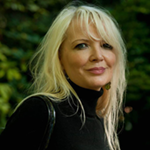GOD THE FATHER
I am six years old and I find out about the apple
passed on from parents to children like a gene,
unfortunately. Fortunately I have Jolka.
Jolka’s mum keeps a little bottle in her bedside table
filled with holy water. It makes warts disappear,
not to mention the invisible sin.
I am six years old and I haven’t been christened.
I worry that I will die and go where
there are more fathers (like mine).
Jolka is six years old too.
She’s been to six christenings
of her six cousins, so she knows.
I lie on a wooden floor,
feeling all the contents of the bottle on my skin.
Jolka makes the sign of the cross and then
we quickly fill the bottle with tap water.
And only Jolka’s mum wonders
why the warts have stopped disappearing.
BAD BOY, YOU BROKE THE DOLL AGAIN
Children may hide, pretend not to hear
shouting, cries, threats and begging. Escape in their minds,
create a friend, an enemy. Tear his arms out,
his legs, his head, bite into his torso, nails, lips.
They may wet their pants.
Eventually they leave wardrobes. They decide they need to
do something. Defend her. But they never succeed.
They don’t know whom they hate more: themselves
or him? Themselves or her? Themselves. No matter, they’ll grow up
when they start believing that all women are whores.
BLACKBERRIES
I don’t need your ears to talk to you.
Mrs. Danka from the top floor caught me first and straightaway
told our mum that nothing good would come out of me talking to myself.
I remember things like our neighbours’ names from forty years ago,
and what we ate on a particular day of the week, but those German words,
them I can’t memorize.
Remember this story? We were at Granny and Grandad’s together,
and Mum stayed away for so very very long, that you stopped asking after her,
and every day, literally every day we went to the woods, first to pick wild strawberries,
then blueberries, mushrooms, raspberries and finally the time came for picking blackberries,
and our hands bled like Jesus’s.
And then in the woods we saw our Mum. Running towards us, waving hello.
She was so light, so cheerful, as if she had never forgotten us. I wanted to run
towards her, to scream my longing out, “Mum, Mum”, but you held me
back so hard, you gripped me as if in the meantime somebody had turned your soft four-year-old body into a thorny blackberry shoot.
Translator’s Note:
I was first introduced to Joanna Fligiel’s poetry by a mutual friend, also a poet, Wioletta Greg, who compared Fligiel’s writing to Anne Sexton’s.
Indeed, I was immediately taken by Fligiel’s verse.
Fligiel was at work on these poems for a long time. I was delighted when the book containing them took its physical form – Rubato was published in 2018 by a small literary independent press in Poland called K.I.T. Stowarzyszenie Żywych Poetów.
Rubato is brave and moving; it is stark and at times shocking. Fligiel uses deceptively simple, almost factual language, which is bare, completely devoid of surplus, to the point that it may seem dispassionate. This language contrasts strongly with the themes she discusses (domestic abuse, sexual abuse, death, illness, also loneliness of a child, growing up in communist Poland). But then perhaps this is the only language that can be used to effectively present such themes? Perhaps the language must be free of anesthesia? Whichever way, Fligiel’s poetry provides a very powerful reader’s experience.
As a translator I was immediately drawn to her writing and the challenge it posed—the apparent simplicity of the vocabulary paired with a heavy emotional load, the fact that the language is so stripped, that there is nothing to hide behind.

Anna Blasiak is a poet and translator. She has translated over 40 books from English into Polish and some fiction and poetry from Polish into English. In addition to her book-length translations, her work has appeared in Best European Fiction 2015, Asymptote, The Guardian, B O D Y Literature, Modern Poetry in Translation and York Literary Review. Anna writes poetry in Polish and in English. Her bilingual collection Café by Wren’s St James-in-the-Fields, Lunchtime is out now. She has worked in museums and a radio station, run magazines, written on art, film and theater. annablasiak.com.

Joanna Fligiel is the founder and editor of Babiniec Literacki and the former editor of Śląska Strefa Gender (2010-2020). The great-granddaughter of a Ravensbrück and Auschwitz prisoner, born in Katowice, raised in a tuberculosis sanatorium in Bystra near Bielsko, she lives in Bielsko-Biała in Poland and in Neuss and Bengel in Germany, constantly traveling between her three homes. She has worked as a bookseller for most of her life. As a child she was a victim of domestic abuse and initially this theme dominated her writing. She has published three volumes of poetry, but wrote more. She is a grandmother, mom, wife and feminist.

 BACK TO ISSUE
BACK TO ISSUE